17.1: Speeches for Special Occasions
17.1.1: The Speech of Introduction
Introductory speeches may not be the main event, but they are key for getting an audience acquainted with their main speaker.
Learning Objective
Define an introduction speech
Key Points
- Introduction speeches are usually brief and always prepared in advance.
- If you know the person you’re introducing, it certainly makes it easier to prepare your remarks. However, be mindful of the context of your relationship to the speaker, and the context of the event itself. For example, avoid an overly casual tone when speaking at a formal event.
- If you don’t know the speaker, conduct some research to get a basic understanding of who they are, as well as any relevant work that applies to their keynote. To help you prepare, consider contacting the speaker in advance to request their professional biography or their curriculum vitae (CV).
Key Terms
- curriculum vitae
-
A detailed written account of one’s education and experience used to seek positions in academic or educational environments, typically including academic credentials, publications, courses taught, etc.
- introduction
-
A means of presenting one person to another.
- keynote
-
A speech that sets the main theme of a conference or other gathering; a keynote speech or keynote address.
The Introduction Speech
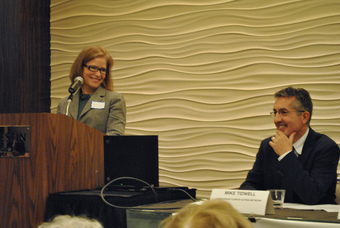
Introduction
You might not be the headliner, but you may get to introduce the keynote speaker.
Sometimes you may be asked to speak at an event or occasion before the headlining speech, or be called upon to introduce a keynote speaker or panelist.
The introduction speech is no less significant than the keynote. It’s important because you’re getting your audience warmed up and accustomed to who will be speaking about the topics and issues they care about. Just as we appreciate when friends introduce us to new acquaintances, your audience appreciates being introduced to their main speaker.
There may be times when you know the person that you’re introducing, so it might be easier to talk about them. Just be mindful of the context of both your relationship and the event itself. You might be buddies with a leading scientist in biology at a biology conference, but that doesn’t mean you should introduce him by the nicknames you call each other on Facebook.
Knowing the person you need to introduce is also helpful as you can ask them directly what information they would or would not like shared about them.
There will also be times where you may only have passing knowledge about the person you’re introducing, or perhaps you might not know anything about them at all. But in the age of the Internet and the Google search, it shouldn’t take very long to find out some basic information about them that is relevant to their speech, such as their professional experience or publications.
You may also be able to contact them to see if they can provide you with a professional bio or curriculum vitae (CV). In the latter instance, you may want to distill that into your own prepared remarks.
The good news is that speeches of introduction are usually brief and always prepared. Whether you’re reading from a script or teleprompter, you typically won’t be asked to introduce someone you don’t know without preparation.
17.1.2: The Speech of Presentation or Acceptance
Acceptance and presentation speeches both occur at events where awards and honors are distributed, but have different focuses.
Learning Objective
Discuss how to prepare an acceptance speech
Key Points
- If you’ve been nominated or won a particular award or honor, always prepare an acceptance speech so you don’t fumble your words once on stage.
- In an acceptance speech, always thank the award-giver, be they an individual or an organization. Don’t forget to thank anyone who helped you achieve your honor, either.
- Speeches of presentation introduce the award itself, tell a little about its history and meaning, and introduce and name the actual awardee.
Key Term
- humble
-
Not proud, arrogant, or assuming; modest.
The Speech of Presentation or Acceptance
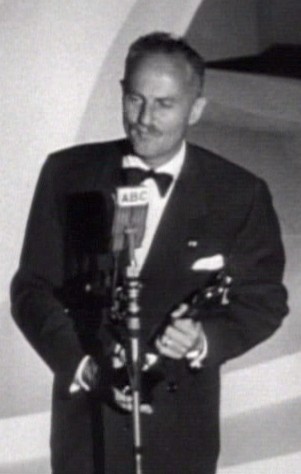
Accepting an Award
Whenever someone is nominated for an award, they should prepare an acceptance speech.
When you think of an acceptance speech, you might think of actress Sally Field clutching her Oscar award shouting into the microphone: “You like me! You really, really like me! “
Often, these speeches are far more humble.
Acceptance Speech
If you’ve been nominated for an award or honor, you may be asked to prepare some remarks in the event you win the award. Other times, you may know that you have won, making it substantially easier to prepare. Acceptance speeches may vary in length. For a multi-award event, such as the Academy Awards, winners are given a brief ninety seconds to make their remarks. At other times, a person could be the single awardee of the evening and have substantially more time to speak, often doubling as keynote speaker.
Acceptance speeches thank the awarding individual or organization. Depending on the award, the awardee may speak about their experience and emotions of getting that award or the work to achieve that award. If others have helped you in your endeavors, you may give them a quick thanks by name as well. If you’re partnered, you may thank your spouse, partner, or children. And if it’s a benefit for the Humane Society, it might even be appropriate to thank your pets!
Like any speech, consider your audience and the context of the speech. While being mindful of your time, get your thanks in while being gracious and humble.
Even if you are one of many in a field of nominees, it’s always a good idea to prepare an acceptance speech so that if you are named the winner, you won’t be fumbling for your words on stage.
Presentation Speech
Similar to the introductory speech, presentation speeches are typically prepared in advance and may describe the awardee before naming them, or describe the circumstances for their awarding.
If the award is named or in memory of someone, you may describe why that award was named in that person’s honor, such as the Pulitzer or Nobel Prize. You may talk about the criteria for selecting the award and how the awardee met that criteria for their specific work.
The speech of presentation is one that is particularly enjoyable to give, as the awardee is often honored to have received the award in the first place!
17.1.3: The Speech to Secure Goodwill
Speeches to secure goodwill seek to forge new relationships between previously unknown, antagonistic, or unfamiliar entities.
Learning Objective
Define a speech to secure goodwill
Key Points
- Goodwill speeches are both informative and persuasive. You seek to persuade your audience to be in favor of you and who or what you represent.
- Goodwill speeches highlight shared values, customs, beliefs, and morals.
- Goodwill speeches do not make assumptions or judgments about their audience and are not meant to intimidate, embarrass, or offend.
- One of the best examples of a goodwill speech is “Ich bin ein Berliner” (I am a Berliner) delivered by President John F. Kennedy in 1963.
Key Term
- goodwill
-
A favorably disposed attitude toward someone or something.
The Speech to Secure Goodwill
Goodwill speeches seek to introduce oneself or an entity to another group, organization, or even country, while building a goodwill relationship with that audience. They may occur on a small scale such as through a maiden speech by the new CEO to a company, or on a large scale, e.g. a world leader touring another country.
Goodwill speeches are informative and persuasive. You are persuading your audience to consider you favorably. You will want to make the case about what makes you qualified or relevant to them. Goodwill speeches also often highlight shared customs, values, morals, and beliefs. Goodwill speeches do not make assumptions or judgments about their audience and do not intimidate, embarrass, or offend them.
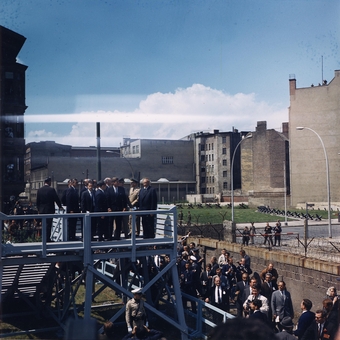
Speech to Secure Goodwill
John F. Kennedy’s famous “Ich bin ein Berliner” (I am a Berliner) is a prime example of a speech to secure goodwill.
Perhaps one of the most famous goodwill speeches was made by President John F. Kennedy in 1963 in Berlin, Germany. Often referred to as “Ich bin ein Berliner” speech (“I am a Berliner”), the speech discusses how to build rapport and favorable attitudes between two differing nations (as excerpted below):
I am proud to come to this city as the guest of your distinguished Mayor, who has symbolized throughout the world the fighting spirit of West Berlin. And I am proud to visit the Federal Republic with your distinguished Chancellor who for so many years has committed Germany to democracy and freedom and progress, and to come here in the company of my fellow American, General Clay, who has been in this city during its great moments of crisis and will come again if ever needed…
…You live in a defended island of freedom, but your life is part of the main. So let me ask you, as I close, to lift your eyes beyond the dangers of today, to the hopes of tomorrow, beyond the freedom merely of this city of Berlin, or your country of Germany, to the advance of freedom everywhere, beyond the wall to the day of peace with justice, beyond yourselves and ourselves to all mankind.
Freedom is indivisible, and when one man is enslaved, all are not free. When all are free, then we can look forward to that day when this city will be joined as one and this country and this great Continent of Europe in a peaceful and hopeful globe. When that day finally comes, as it will, the people of West Berlin can take sober satisfaction in the fact that they were in the front lines for almost two decades.
All free men, wherever they may live, are citizens of Berlin.
And, therefore, as a free man, I take pride in the words, “Ich bin ein Berliner. “
17.1.4: Commemorative Speeches: Dedications and Eulogies
Dedications and eulogies are two types of commemorative speeches that memorialize people and/or events.
Learning Objective
Identify types of commemorative speeches
Key Points
- Dedications may honor an individual, a group of individuals, or a specific event.
- Eulogies honor a specific deceased person, celebrating the life he lived rather than mulling on the manner or circumstances of their death.
- It is entirely acceptable for speech givers to become emotional when delivering these types of speeches (especially eulogies) as they can evoke strong emotions with both speaker and audience.
Key Terms
- dedication
-
A ceremony marking an official completion or opening.
- eulogy
-
An oration to honor a deceased person, usually at a funeral.
- commemorate
-
To honor the memory of someone or something with a ceremony.
The Commemorative Speech
Commemorative speeches are those that celebrate and honor the memory of someone or something. If you consider various memorial holidays and observances throughout the year, such a Memorial Day in the United States, many people commemorate the occasion by remembering fallen veterans. In England, the English commemorate their fallen heroes by wearing poppies on Remembrance Day.
The Dedication
The dedication is a very specific type of commemorative speech. It is often accompanied by a ceremony accompanying an official opening or completion of something. The speech honors the event, individual or groups of people to which the items are being dedicated. Take for example, the dedication of the National Cemetery in Gettysburg, Pennsylvania in 1863, by then President Abraham Lincoln:
Fourscore and seven years ago our fathers brought forth on this continent a new nation, conceived in Liberty, and dedicated to the proposition that all men are created equal. Now we are engaged in a great civil war, testing whether that nation, or any nation so conceived and so dedicated, can long endure. We are met on a great battlefield of that war. We have come to dedicate a portion of that field, as a final resting-place for those who here gave their lives that that nation might live. It is altogether fitting and proper that we should do this. But, in a larger sense, we cannot dedicate—we cannot consecrate—we cannot hallow—this ground. The brave men, living and dead, who struggled here, have consecrated it far above our poor power to add or detract. The world will little note nor long remember what we say here, but it can never forget what they did here. It is for us, the living, rather, to be dedicated here to the unfinished work which they who fought here have thus far so nobly advanced. It is rather for us to be here dedicated to the great task remaining before us—that from these honored dead we take increased devotion to that cause for which they gave the last full measure of devotion; that we here highly resolve that these dead shall not have died in vain; that this nation, under God, shall have a new birth of freedom; and that government of the people, by the people, for the people, shall not perish from the earth.
The Eulogy
A eulogy is a very specific type of commemorative speech that occurs at a person’s funeral. Where a dedication may commemorate an event, an eulogy commemorates a specific deceased person. Eulogies may include memories and anecdotes of that person’s life. Rather than focusing on how or why a person died, the eulogy celebrates the life he lived. It can be extremely emotionally difficult to deliver a eulogy for a friend or family member. In many circles, it is often expected that the eulogy reader may cry or become upset while speaking as they remember their loved one.
President Lincoln was remembered by Josiah Gilbert Holland, on the occasion of his funeral in 1865:
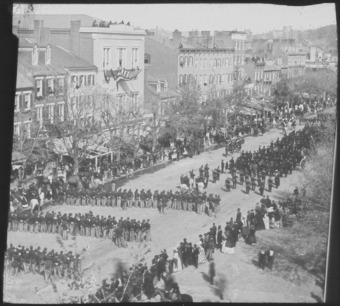
Giving a Eulogy
President Abraham Lincoln’s funeral procession on Pennsylvania Avenue on April 19, 1865.
Our President is dead. He has served us faithfully and well. He has kept the faith; he has finished his course. Henceforth there is laid up for him a crown of glory, which the Lord, the righteous Judge, shall give him in that day. And He who gave him to us, and who so abundantly blest his labors, and helped him to accomplish so much for his country and his race, will not permit the country which He saved to perish. I believe in the overruling providence of God, and that, in permitting the life of our Chief Magistrate to be extinguished, He only closed one volume of the history of His dealings with this nation, to open another whose pages shall be illustrated with fresh developments of His love and sweeter signs of His mercy. What Mr. Lincoln achieved he achieved for us; but he left as a choice a legacy in his Christian example, in his incorruptible integrity, and in his unaffected simplicity, if we will appropriate it, as in his public deeds. So we take this excellent life and its results, and, thanking God for them, cease all complaining and press forward under new leaders to now achievements, and the completion of the great work which he who has gone left as a sacred trust upon our hands.
17.1.5: The Inspirational Speech
Inspirational speeches are ones that are memorable, truly inspiring, and ones that can stand the test of time.
Learning Objective
Define an inspirational speech
Key Points
- Inspirational speakers are often characterized as warm, encouraging and able to connect and engage almost instantly with their audiences.
- Inspirational speeches elicit strong emotional responses from their audiences.
- Not all inspirational speeches must be geared toward positive or happy messages; many times, these speeches are often used in “rally the troops” situations.
Key Term
- inspire
-
To infuse into the mind; to communicate to the spirit; to convey, as by a divine or supernatural influence; to disclose preternaturally; to produce in, as by inspiration.
Example
- In the movie Braveheart, William Wallace (played by Mel Gibson) delivers this rousing and classic inspirational speech to Scots about to fight the English troops: “I AM William Wallace. And I see a whole army of my countrymen here in defiance of tyranny. You have come to fight as free men, and free men you are. What would you do without freedom? Will you fight? Aye, fight and you may die. Run and you’ll live — at least a while. And dying in your beds many years from now, would you be willing to trade all the days from this day to that for one chance, just one chance to come back here and tell our enemies that they may take our lives, but they’ll never take our freedom! “
The Inspirational Speech

“They may take our lives, but they’ll never take our freedom!”
An inspirational speech straight out of Hollywood in the Mel Gibson classic, Braveheart.
When we think of the word “inspire,” we typically think of motivational and rousing ideas and imagery. In a very literal sense, inspiration is a synonym of the biological function of inhalation: by inspiring, we take air into our lungs.
It only makes sense then, that inspirational words, images and situations cause our chests to swell with pride, excitement or even anger. Inspiration can elicit extreme emotional responses within us. As such, the inspirational speech is one that can elicit those same strong emotional responses within our audiences, no matter their size.
Some of the most famous inspirational speeches in history include Martin Luther King Jr.’s “I Have a Dream” and President John F. Kennedy’s inauguration speech. A modern day example could be President Barack Obama’s “Yes We Can” campaign stump speech made in 2008.
The power of these speeches lies in the rousing words and imagery that capitalize on the emotional response of their audiences. Inspirational speakers are often characterized as warm, encouraging, and able to instantly connect and engage with their audiences.
But not all messages are necessarily warm and fuzzy; take for example, the speech made popular by actor Mel Gibson as William Wallace in the film, Braveheart, as he motivates his ragtag band of Scotsmen to fight against the English troops:
Wallace: Sons of Scotland, I am William Wallace.
Young soldier: William Wallace is 7 feet tall.
Wallace: Yes, I’ve heard. Kills men by the hundreds, and if he were here he’d consume the English with fireballs from his eyes and bolts of lightning from his arse. I AM William Wallace. And I see a whole army of my countrymen here in defiance of tyranny. You have come to fight as free men, and free men you are. What would you do without freedom? Will you fight?
Veteran soldier: Fight? Against that? No, we will run; and we will live.
Wallace: Aye, fight and you may die. Run and you’ll live–at least a while. And dying in your beds many years from now, would you be willing to trade all the days from this day to that for one chance, just one chance to come back here and tell our enemies that they may take our lives, but they’ll never take our freedom!
Wallace and Soldiers: Alba gu bra! (Scotland forever! )
The successful inspirational speech is one that is memorable, truly inspiring, and one that can stand the test of time.
17.1.6: Other Speeches: Farewells, Toasts, and After-Dinner Remarks
Farewells, toasts, and after dinner remarks are often the lightest fare when it comes to public speaking.
Learning Objective
Distinguish a light speech such as a farewell, toast, or after dinner remark from other types of public speaking
Key Points
- Farewells, toasts, and after dinner remarks typically require much less preparation than formal speeches.
- Farewells, toasts, and after dinner remarks often use humor and anecdote to entertain a crowd and/or celebrate a guest or guests of honor.
- It’s okay to poke fun at the guest of honor, but the goal is to entertain, not humiliate.
- Brevity is an artform and a gift when it comes to informal speeches like these.
Key Terms
- farewell
-
a wish of happiness or welfare at parting, especially a permanent departure; the parting compliment; a goodbye; adieu.
- roast
-
(Originally fraternal) a comical event where a person is subjected to verbal attack, yet may be praised by sarcasm and jokes.
- toast
-
to engage in a salutation and/or accompanying raising of glasses while drinking alcohol (or other appropriate beverage) in honor of someone or something.
Farewells, Toasts, and After-Dinner Remarks
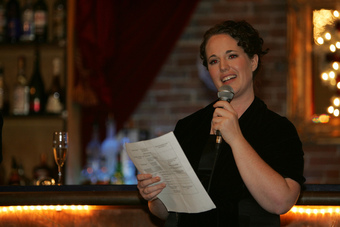
After-Dinner Speeches
Maid and Matron of Honor, as well as Bridesmaids’ speeches, are becoming the norm at wedding receptions.
Special occasion speeches are, to put it lightly, the “life of the party” when it comes to public speaking. Farewells, toasts, and after dinner remarks are often the lightest of public speaking fare, requiring little in preparation or execution. Humor, anecdote, and brevity are notable qualities of these types of speeches. Still, like any public speaking experience, it helps to be familiar with your subject and able to prepare, even if briefly beforehand.
Many times, these speeches are not written extensively prior to the speaking engagement. You may jot down a few key talking points or maybe a specific joke or anecdote that you wish to include.
Like preparing for any speech, regardless of formality, consider the audience, venue, and occasion for which you’re speaking. It’s also particularly helpful, especially for wedding toasts, to consider the span of ages in the room. If there is a particularly older or younger crowd, you may need to tailor your material accordingly so that all audience members can relate.
Many times, farewells, toasts, and after dinner speeches are made in honor or in celebration of someone else: a guest or guests of honor, or perhaps the event host or hostess themselves. While it’s acceptable to poke fun, make sure you do so in a way that’s kind and not cruel. Unless you’re specifically giving remarks for a full on roast, you shouldn’t overly embarrass your guest of honor. You’re there to entertain, not humiliate.
It’s important to remember that brevity is your friend in all of these situations: no one likes a toast that goes on forever while the champagne bubbles go flat. To quote Esenwein and Carnagey, authors of The Art of Public Speaking:
Blessed is the man that maketh short speeches, for he shall be invited to speak again.
